|
|
|
Sort Order |
|
|
|
Items / Page
|
|
|
|
|
|
|
| Srl | Item |
| 1 |
ID:
130198
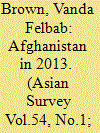

|
|
|
|
|
| Publication |
2014.
|
| Summary/Abstract |
Uncertainties about the 2014 security, political, and economic transitions pervaded Afghanistan in 2013. The failure in 2013 to sign a U.S.-Afghan security agreement permitting the presence of U.S. troops after 2014 deepens those anxieties. As ISAF forces continued to withdraw from Afghanistan, Afghan security forces now have primary responsibility for Afghanistan's security but still face critical challenges and an undefeated Taliban. Peace negotiations have been stalled. Politics were dominated by the upcoming 2014 presidential election that can renew the legitimacy of the existing political system or throw the country into turmoil.
|
|
|
|
|
|
|
|
|
|
|
|
|
|
|
|
| 2 |
ID:
128232
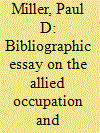

|
|
|
|
|
| Publication |
2013.
|
| Summary/Abstract |
There is no definitive, single-volume history of the Allied occupation and reconstruction of West Germany from 1945 to 1955. This is a significant and surprising lacuna in the literature on US and European history, international relations, and the rapidly growing field in reconstruction and stabilization operations. Scholars, historians, and policymakers need a comprehensive treatment of the German occupation. There is now an opportunity to fill that need. This bibliographic essay reviews the wealth of source material that has become available in recent decades. We can now synthesize primary sources and specialized scholarship to tell the story, for the first time, of how the Allies occupied and rebuilt the western part of Germany.
|
|
|
|
|
|
|
|
|
|
|
|
|
|
|
|
| 3 |
ID:
188865
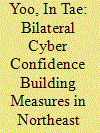

|
|
|
|
|
| Summary/Abstract |
Under what conditions do countries form confidence building measures (CBMs)
in the cyber domain? How do those conditions affect the frequency and type of
cyber CBMs (CCBMs)? The extant literature surveys existing CCBMs, providing
fragmented pictures of them at either the global, regional, or bilateral levels.
Thus, there is a lack of systematically comparative perspectives between multiple
efforts for states’ cyber confidence–building. This deficiency implies that little
to no research has been dedicated to analytical examinations of the development
of CCBMs. The present article offers a framework to assess the development
and theoretical arguments to understand its underlying causes. It argues that the
willingness of political leaders affected by the international strategic–security
context is a necessary condition, in addition to the cost-benefit calculation of
policymakers, affecting the frequency and type of CCBMs. To examine the
arguments, the present article overviews the global development of the discussion
of CCBMs at the UNGGE and OEWG. Then it presents the networks of CCBMs
in Northeast Asia where the staunchest alliances as well as fierce strategic–security
competitions have taken hold in the emergence of the new cyber domain. Lastly,
the article investigates the processes of bilateral CCBMs formation in three dyads
between the United States and each of three states, namely, Russia, China, and
Japan. The empirical findings support the theoretical arguments
|
|
|
|
|
|
|
|
|
|
|
|
|
|
|
|
| 4 |
ID:
156246
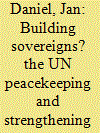

|
|
|
|
|
| Summary/Abstract |
This paper contributes to the debate on the recent ‘stabilization turn’ in United Nations (UN) peacekeeping by inquiring into a changing set of practices by which the UN intends to ‘strengthen the authority of the state.’ Drawing on Piiparinen’s notion of sovereignty-building as an emerging paradigm of conflict management, the study analyses the support for state authority and sovereignty in two modalities of contemporary UN peace operations – UNIFIL II and MINUSMA. While the two analysed missions significantly differ when it comes to the extent of their tasks, or the rules for the use of force, they both highlight the importance of local politics and agency in the implementations of their mandates and the need to strike a compromise between the contending visions on what form of sovereignty should be supported. By doing so, the paper points out the importance of ‘local’ and contextual emergence of the practices of sovereignty-building.
|
|
|
|
|
|
|
|
|
|
|
|
|
|
|
|
| 5 |
ID:
132268
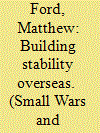

|
|
|
|
|
| Publication |
2014.
|
| Summary/Abstract |
In 2011, the Department for International Development, the Foreign & Commonwealth Office, and the Ministry of Defence launched the Building Stability Overseas Strategy (BSOS). This document sought to integrate cross-government activity as it related to conflict and security so as to 'take fast, appropriate and effective action to prevent a crisis or stop it escalating and spreading'. At the heart of the strategy was the recognition that addressing instability and conflict overseas was morally right and in the UK's national interests. This confluence of foreign policy realism and ethical outlook most clearly found harmony in the acknowledgement that it was cheaper for the international community to avoid conflict than it was to try to manage it. Through an examination of three historical case studies (Uganda 1964-1972, Rhodesia-Zimbabwe 1979-1981, and Sierra Leone 2000-2007), this article seeks to demonstrate just how difficult this seemingly sensible strategic outlook is. In particular, the article shows there are historical parallels in British postcolonial history that very closely resemble contemporary policy choices; that these can be used to define what is different about past and present practice; and, which in turn, can be used to - at least tentatively - mark out the potential strengths and weaknesses in BSOS.
|
|
|
|
|
|
|
|
|
|
|
|
|
|
|
|
| 6 |
ID:
159965
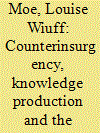

|
|
|
|
|
| Summary/Abstract |
Counterinsurgency witnessed a powerful revival in our post-9/11 world. With its focus on the control of territory, populations and seemingly less kinetic hearts and minds campaigns—as well as a good dose of liberal humanitarianism—contemporary counterinsurgency has become the dominant form of the Western military interventionism. While most of the associated debates focus on the potentials and pitfalls of Western counterinsurgency approaches, the role of South-South cooperation in the making of ‘Global Counterinsurgency’, and the related emerging geopolitical convergences of interest between Western and non-Western elites in counterinsurgency, has received little attention. In focusing on counterinsurgency-related forms of knowledge production, and by analyzing the role of transnational military knowledge entrepreneurs promoting a form of coercive Realpolitik that supports ‘locally owned’ elite-driven counterinsurgency efforts in the field of South-South military cooperation between Colombia and Somalia, this article addresses this void. We show that conventional North/South divides no longer capture the realities of counterinsurgent warfare going global and call for a de-centering of the study of military interventions that is sensitive to how knowledge production in regards to ‘Global South’ contexts not only makes them legible, and thereby more governable, but also how this knowledge production informs ongoing reconfiguration of interventions themselves.
|
|
|
|
|
|
|
|
|
|
|
|
|
|
|
|
| 7 |
ID:
177846
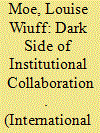

|
|
|
|
|
| Summary/Abstract |
Within the field of international peace and security, policy makers and analysts alike commonly treat collaboration and convergence among international organizations and intervention frameworks as a policy objective in itself. Indeed, from the focus on the ‘comprehensive approach’, during the 2000s, to the recent emphasis on multi-dimensional and integrated stabilization frameworks, institutional collaboration is cast as inherently positive and desirable in regard to addressing international collective matters. This article challenges such ‘collaboration bias’. It does so by exploring the empirical effects of increasing collaboration and ‘strategic partnerships’ within the context of the current (re)turn to stabilization interventions. Specifically, focusing on Mali, it unpacks how contemporary stabilization efforts intensify collaboration across counterterrorism and peacekeeping interventions in ways that undercut policy implementation within one of the most central peacekeeping priority areas, namely the Protection of Civilians (PoC). In detailing key aspects on which contemporary peacekeeping-counterterrorism entanglements compromise protection efforts, the article conveys some of the ‘dark sides’ of cooperation regimes. It moreover highlights the need to not only explore regime complexity as a systemic feature of world politics but also unpack how it operates, and to what effect, at the meso and micro levels of policy implementation and practice.
|
|
|
|
|
|
|
|
|
|
|
|
|
|
|
|
| 8 |
ID:
132280


|
|
|
|
|
| Publication |
2014.
|
| Summary/Abstract |
The use of conventional armed forces in a deterrent role merits close consideration. Instability in weak or failing states can have global ramifications, while efforts to build stability take time. In principle, conventional deterrence can be used to buy the time required for such stabilization efforts. Attempts at deterrence will, however, need to overcome credibility problems stemming from the technical limitations associated with conventional armed forces, and with the likely requirement for multiple external actors to deter multiple intrastate audiences. While deterrence might work under certain circumstances, it will not play as central a role in strategy as it did during the Cold War.
|
|
|
|
|
|
|
|
|
|
|
|
|
|
|
|
| 9 |
ID:
096223
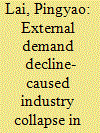

|
|
|
|
|
| Publication |
2010.
|
| Summary/Abstract |
Industry collapse has become an important phenomenon in China's recent economic growth fluctuation. This paper develops a simple model to analyze this phenomenon. Our analysis focuses on an external demand decline-caused industry collapse. The model reveals that the combination of large-scale decline in external demand with a horizontal domestic supply curve causes the domestic export industry to undergo a sharp decrease in output in a short period of time, which further leads to a sharp decline in employment. The conventional stabilization policy is less effective in coping with this sudden industry collapse. The Chinese Government needs to formulate an appropriate structural industry stabilization policy to cope with the sudden industry collapse, and, in particular, to implement a direct employment aid program to deal with unemployment resulting from the industry collapse.
|
|
|
|
|
|
|
|
|
|
|
|
|
|
|
|
| 10 |
ID:
174333
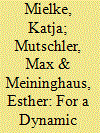

|
|
|
|
|
| Summary/Abstract |
Stabilization is a contestable concept of intervention in violent conflicts. Often, it is either uncritically supported or rejected. In this article, we criticize current conceptualisations and practices of stabilization and newly introduce a dynamic approach for stabilization that yields a transformative potential. By distinguishing static vs. dynamic approaches to stabilization, we address the widespread dilemma that so-called stabilization measures seem unable to avoid instability and protracted violence in the long-term. Our analysis of the three policy fields peacekeeping, train & equip programmes and migration management in Mali reveals the dominance of static elements in stabilization practice. Instead, our article proposes to see a transformative variant of stabilization measures that enhances long-term security and development. We argue that there are two dynamic approaches of stabilization that policy-makers and practitioners can apply in (post-)conflict societies: state-centred liberal peacebuilding that takes its normative core seriously, and non-state centric peacebuilding that acknowledges alternative lived orders.
|
|
|
|
|
|
|
|
|
|
|
|
|
|
|
|
| 11 |
ID:
170278
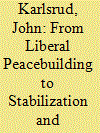

|
|
|
|
|
| Summary/Abstract |
Since the end of the Cold War, international interventions have increasingly been deployed to deal with internal conflict. Liberal peacebuilding has been a guiding concept for many of these interventions, in particular those deployed by the UN. This article argues that liberal peacebuilding is waning in importance, both as a guiding concept and in practice. After long engagements in Afghanistan and the enduring effects of the financial crisis, Western states are shifting their strategy from liberal peacebuilding to stabilization and counterterrorism. In Africa, regional ad hoc coalitions set up to fight terrorists and other armed groups are on the rise, and progressively included in UN peacekeeping operations. To examine these shifts more closely, the article focuses on the crisis in Mali since 2012 and the growing Western security presence in neighbouring Niger. The article concludes that the turn from liberal peacebuilding to stabilization and counterterrorism is likely to be counterproductive, as it will lead to more oppressive governments and more disillusioned people joining the ranks of opposition and terrorist groups, as well as undermine the UN in general and UN peace operations in particular.
|
|
|
|
|
|
|
|
|
|
|
|
|
|
|
|
| 12 |
ID:
177759
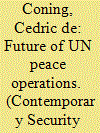

|
|
|
|
|
| Summary/Abstract |
This article considers the future of UN peace operations through a complexity theory lens. In the short-term peacekeeping will have to adapt to the consequences of the COVID-19 pandemic and the fall-out of the Trump presidency. In the medium-term peacekeeping will go through a phase of uncertainty and turbulence due to geopolitical power shifts in the global order. In the longer-term peacekeeping will have to adapt to a new multipolar global order characterized by coexistence, and a changing security landscape shaped by, among others, climate change, urbanization, and new technologies. Throughout these contraction, moderation, and adjustment phases, UN peacekeeping is likely to be guided by a principled adaptive approach, that allows it to adapt to the realities of the moment whilst staying true to its core form and identity. As a result, UN peacekeeping is likely to remain one of the most visible symbols of global governance and international cooperation.
|
|
|
|
|
|
|
|
|
|
|
|
|
|
|
|
| 13 |
ID:
132282
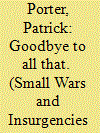

|
|
|
|
|
| Publication |
2014.
|
| Summary/Abstract |
This article reflects on a decade of British counterinsurgency operations. Questioning the idea that lessons have been learnt, the paper challenges the assumptions that are being used to frame future strategic choice. Suggesting that defence engagement is primarily focused on optimising overseas interventions while avoiding a deeper strategic reassessment about whether the UK should be undertaking these sorts of activities, the article calls for a proper debate on Britain's national security interests.
|
|
|
|
|
|
|
|
|
|
|
|
|
|
|
|
| 14 |
ID:
190452
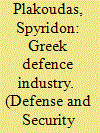

|
|
|
|
|
| Summary/Abstract |
Greece was never internationally renowned for its defence industry; in fact, its state-owned industries were usually a source of headaches rather than income for Athens. The Debt Crisis (2008-18) compounded the chronic ills of the Greek defence ecosystem which appeared to decline irreversibly. And yet, in recent years they rebounded and reached new heights. How can this surprising turnaround be explained? And what does it indicate for the future of the Greek defence industry? This paper aspires to examine how the Greek defence ecosystem (state- and private-owned) evolved from a stage of stagnation and decline into a phase of stabilisation.
|
|
|
|
|
|
|
|
|
|
|
|
|
|
|
|
| 15 |
ID:
166782
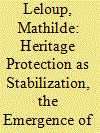

|
|
|
|
|
| Summary/Abstract |
The integration of new tasks like those of cultural and natural heritage management into the mandates of UN peace operations is usually presented as a burden, ‘a star on the top of the Christmas tree’ at a time of scarce human and budgetary resources for contemporary UN peace operations. Through a comparison of MINUSMA in Mali and MONUSCO in DRC, this article aims to demonstrate how, on the contrary, heritage management can bring consistency to the broader ‘stabilization’ mandate mainstreamed in UN peace operations. By creating new links between the seemingly dichotomous activities it encompasses, namely ‘support’ and ‘securization’ activities, this new type of mandated task can increase complementarity between civilian and military components of UN peace operations with regard to local population. As part of their stabilization mandates, both MINUSMA and MONUSCO were charged to protect heritage. Ultimately, the most decisive factor as to why heritage management created a virtuous circle in Mali and a vicious circle in DRC, seems to be the failure or the success on the part of peace operations to include local communities in the heritage management process, a task which is so far better performed by the civilian than by the military component.
|
|
|
|
|
|
|
|
|
|
|
|
|
|
|
|
| 16 |
ID:
177855
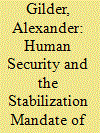

|
|
|
|
|
| Summary/Abstract |
This article looks narrowly at whether a ‘human security’ approach can be seen in a UN peace operation that pursues stabilization, namely the United Nations Multidimensional Integrated Stabilization Mission in the Central African Republic (MINUSCA). The UN’s interpretation of stabilization has not been expressly set out, but stabilization missions typically work alongside the host state to extend state authority and use robust force to counter spoilers. Human security is a concept which is rights-based, promotes the ‘vital core’, has a concern for vulnerability, utilizes preventative protection methods, and empowers local persons to have agency in the peace process. Attempts have been made to institutionalize and mainstream human security practices within the UN. An analytical framework of human security is outlined in this article and used to assess to what extent the mandate of MINUSCA pursues human security-based goals. An extensive review of UN documentation looks at the mandate and practice of MINUSCA and it is argued that the mission does seek to empower local people, engage in a bottom-up manner and entrench the rule of law. The analytical framework also casts light on aspects of the stabilization mandate which are problematic such as militarization and cooperation with the host state.
|
|
|
|
|
|
|
|
|
|
|
|
|
|
|
|
| 17 |
ID:
103295
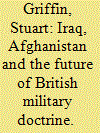

|
|
|
|
|
| Publication |
2011.
|
| Summary/Abstract |
The campaigns in Iraq and Afghanistan have had profound effects on both the British and US militaries. Among the most important is the way in which they have challenged traditional assumptions about the character of unconventional conflict and the role of the military within comprehensive strategies for encouraging sustainable peace. In the UK, the most important doctrinal response has been JDP 3-40 Security and Stabilisation: the military contribution. Security and Stabilisation is an ambitious attempt to synthesize elements of counterinsurgency, counterterrorism, peace support and state-building within a single doctrine that reflects the lessons learned from recent British operational experience. This article examines the purpose, impact and potential value of this important innovation in British doctrine. To do so, the article explores the genesis of Stabilization; analyses its impact upon extant British doctrine for counterinsurgency and peace support; discusses its relationship with the most important related US doctrines, FM 3-24: the counterinsurgency field manual and FM 3-07: the stability operations field manual; and debates the function of doctrine more broadly. It concludes by summarizing the primary challenges Security and Stabilisation must overcome if it is to make a serious contribution to the theory and practice of such complex interventions.
|
|
|
|
|
|
|
|
|
|
|
|
|
|
|
|
| 18 |
ID:
121456
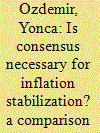

|
|
|
|
|
| Publication |
2013.
|
| Summary/Abstract |
By studying two Middle Eastern cases, Israel and Turkey, this study seeks to understand how countries with chronically high inflation achieve permanent stabilization. It is argued that each case of successful stabilization is facilitated by a combination of favourable political conditions. Having an acute crisis is a necessary though not a sufficient condition. It is argued that what politically seems to help most is the creation of 'social and political consensus'. A wide support for stabilization is more likely if the stabilization plan distributes the costs of stabilization more equally. Skilful leaders also help build consensus and they are more important where other conditions are unfavourable. All these conditions were instrumental in the case of Israel, which is a stable and established democracy. The Turkish case demonstrates that if stabilization is initiated without a consensus, it would prove to be a political disaster for the implementing government. However, rapid positive economic results and favourable political changes may later contribute to creating political and social support for stabilization. In fact, for stabilization to be successful, consensus in the medium term is as or even more important than consensus in the short term.
|
|
|
|
|
|
|
|
|
|
|
|
|
|
|
|
| 19 |
ID:
115327
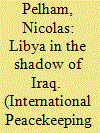

|
|
|
|
|
| Publication |
2012.
|
| Summary/Abstract |
In formulating its plans for government, the National Transitional Council (NTC), the political arm of the anti-Qaddafi uprising in 2011, was heavily guided by international thinking regarding the experience of de-Ba'athification in Iraq. In attempting to avoid 'reliving the Iraq war', the NTC, made a conscious decision to integrate the 'Old Guard' into the new order, but thereby created new challenges by alienating those who had led the rebellion. This Eyewitness is based on insights - from the author's interviews in Libya (particularly at the Second Congress of the rebel militias of April 2012), and argues that the fledgling central authority added to post-Qaddafi instability by failing to secure the buy-in of the rebel militias into their post-conflict vision of a civilian order, replete with elections. It concludes that in their zeal to correct the mistakes the West made in Iraq, Libya's new authorities may well have over compensated creating fresh obstacles to the country's stabilization and reconstruction.
|
|
|
|
|
|
|
|
|
|
|
|
|
|
|
|
| 20 |
ID:
112485
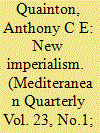

|
|
|
|
|
| Publication |
2012.
|
| Summary/Abstract |
As a result of the wars undertaken in Iraq and Afghanistan by the George W. Bush administration, the United States has taken on a responsibility to reconstruct the political and economic institutions of these countries. This responsibility has been carried out through provincial reconstruction teams that operate at the local level to rebuild the societies shattered by war. In conceptual terms, the responsibility increasingly reflects the new emphasis on reconstruction and stabilization operations laid out in the State Department's 2011 Quadrennial Defense and Development Review, which sets the groundwork for future interventions both to prevent states from failing and to rebuild states devastated by war or natural disaster. The ambitious nature of this strategy suggests a new age of American imperialism under which the "responsibility to protect" of the 1990s may become the "responsibility to fix" of the twenty-first century.
|
|
|
|
|
|
|
|
|
|
|
|
|
|
|
|
|
|
|
|
|